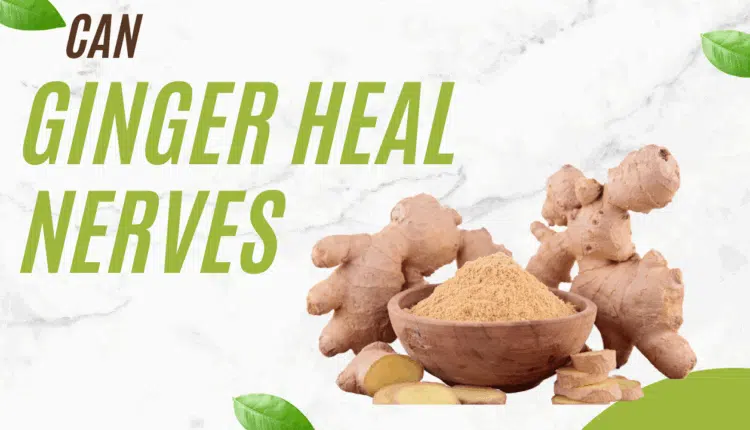Can Ginger Help with Neuropathy? What Science Says
Ginger forged its way from the kitchen to the realm of medicine. For the last 30 years, we have studied its medical benefits and created an incredible elixir that instantly boosts your immune system and stops chronic coughing.
Ginger: From Ancient Medicine to Modern Science
The humble ginger root was revered in Southeast Asia for its aromatic zest and flavor. As it traveled across continents, many ancient cultures began to discover the spice’s healing properties.
China uses ginger for stomach upsets and nausea. Then, India adopted it in their Ayurvedic medicine, a form of natural medicine. It is estimated that 80% of India’s population, approximately 1.2 billion people, still use some form of traditional Ayurvedic medicine.
Ginger’s ability to ease digestion and reduce inflammation caught the attention of holistic healers worldwide. However, modern science examined it and discovered its true potential.
Starting in the early 1990s, scientists began to notice ginger and its claims to improve the digestive system, increase memory, clear hepatic obstructions, dissipate phlegm, and stop diarrhea caused by food poisoning. As a result, scientists started clinical studies on ginger.
Ginger’s Health Benefits
Over the last 30 years, research has proven many benefits of ginger.
400 Bioactive Compounds
Ginger has over 400 types of bioactive compounds, including phenols and terpenes. Phenols protect plants from UV radiation, pathogens, parasites, and predators. They also contribute to the plant’s color. Terpenes are responsible for the plant’s aroma and flavor.
Terpenes also contribute to ginger’s health benefits. They possess antioxidant, antiulcer, and anticancer properties. For instance, one specific terpene, beta-elemene, can stop the cellular division of glioma (a form of brain tumor) and can evoke cell death of lung cancer cells, sending patients into remission.
Most terpenes are present in the essential oils of ginger.
Phenols are ginger’s most powerful constituents. There are four major biologically active compounds: gingerols, shogaols, zingerone, and parasols. In recent years, studies have found that these four agents possess powerful antioxidant, anti-inflammatory, anti-microbial, anti-fungal, and anticancer activities.
Lowers Inflammation
Ginger assists peripheral nerves by lowering inflammation, which plays a significant role in the frequency and intensity of neuropathy symptoms. The more inflammation associated with your peripheral nerves, the stronger and longer-lasting the symptoms will be.
The compounds 6-gingerol and 6-shojale inhibit the production of inflammatory mediators like prostaglandins and inflammatory cytokines. By inhibiting these, peripheral neuropathy pain and symptoms can subside.
Pain Reduction
While many earlier studies focused on muscle or joint pain, dysmenorrhea, and migraines, more studies are now focusing on ginger’s role in nerve pain. One study showed that ginger root mitigated the symptoms of diabetic neuropathy.
It also has been shown to reduce arthritis pain and inflammation.
Prevents Nausea and Stomach Issues
Ginger also is extremely effective in preventing nausea and vomiting. It enhances digestion and aids in the healing of gastric ulcers.
Research also shows it reduces both acute and chronic colitis symptoms.
Reduces Risk Factors of Metabolic Syndromes
Studies show that ginger can reduce metabolic syndrome risk factors, such as triglycerides, harmful lipid profiles, insulin resistance, and C-reactive proteins, an inflammatory marker.
Improves Respiratory Issues
Other benefits include improving symptoms of acute respiratory distress associated with pneumonia, bronchitis, flu, and asthma.
Dr. Monteiro and I have prescribed ginger tea to stop violent coughing spells induced by bronchial irritation, and it worked within five minutes.
The Best Ways to Use Ginger for Pain, Digestion, and Inflammation
The tea we’ve used for many patients is extremely effective and tastes great. We always recommend making it in a large batch, placing it in a thermos or glass bottle, and refrigerating it.
Ginger Tea
You will need 32 oz of spring water or purified water, 2 oz of ginger root (raw and cleaned), 2 fresh lemons, and ⅓ cup of raw honey.
Then, you are ready to make it.
- Place ginger in a food processor to mince
- Juice both lemons and set aside
- Place water in a pot and bring to a boil on the stove
- Add minced ginger, reduce heat, and simmer for 20 minutes
- Remove from heat and let it stand for five minutes
- Add honey and the fresh lemon juice and stir until mixed well
- For additional sweetness, use monk fruit or stevia
Lastly, enjoy your tea!
Ginger Supplements
Other than tea, a monumental study revealed that supplementation with ginger significantly reduced the length of hospital stays for patients with COVID. Studies showed that dried ginger exhibited the most potent antioxidant activity when trying to increase its antioxidant benefits.
When you remove the moisture in fresh ginger, the polyphenol content becomes more concentrated and more potent. However, fresh ginger still has significant health benefits.
We recommend Medi-Herb or Herb Pharm for liquid forms and Pure Encapsulations Ginger Extract if you prefer capsules.
Experts say that using two grams twice daily could help manage pain and inflammation, and the dosage is safe.
Ginger Essential Oils
Another method we recommend is ginger essential oil. The oil contains a compound called zingibain, which possesses potent anti-inflammatory properties.
You rub two to three drops of the oil on the affected area a few times throughout the day. You can also diffuse it to boost your mood. For nausea, you rub a few drops over the stomach.
We use Aura Cacia and Young Living Oils.
Freshly Grated Ginger in Food
We love throwing freshly grated ginger into our protein shakes or smoothies for zest and medicinal benefits.
It is truly incredible how this humble root made its mark in history and continues to astound us with medicinal benefits. Although this potent spice does not repair nerves, it can significantly reduce systemic inflammation and symptoms.
Struggling with Neuropathy?
Dr. Coppola and Dr. Monteiro’s dedication to combating neuropathy is deeply personal, stemming from Dr. Monteiro’s experience with her mother’s severe chemo-induced neuropathy. This personal journey fueled their commitment to develop a systematic, drug-free approach to reversing neuropathy.
They founded the San Antonio Neuropathy Center, where they’ve successfully treated over 18,000 patients over the past two decades. Their acclaimed book, “Defeat Neuropathy Now in Spite of Your Doctor,” along with their neuropathy product line, stands as a testament to their expertise and innovative solutions.
Recognized as leading neuropathy specialists in America, Dr. Coppola and Dr. Monteiro offer a beacon of hope for those diagnosed with this challenging condition. If you or a loved one is seeking relief from neuropathy, reach out to us at 844 400-0101 or email us through our contact page – Click here.
Your path to healing can start today.

REFERENCES
Ginger
https://www.ncbi.nlm.nih.gov/pmc/articles/PMC4377061/
Terpenes:
Herbs for neuropathic pain:
https://www.ncbi.nlm.nih.gov/pmc/articles/PMC5960749/
https://www.ncbi.nlm.nih.gov/pmc/articles/PMC9193716/
https://www.ncbi.nlm.nih.gov/pmc/articles/PMC7551261/
https://www.sciencedirect.com/science/article/abs/pii/S0955286321003247
https://www.ncbi.nlm.nih.gov/books/NBK565886/
Neurodegenerative dz:
https://www.ncbi.nlm.nih.gov/pmc/articles/PMC8971783/
https://www.ncbi.nlm.nih.gov/pmc/articles/PMC4211852/
Biological activity:
https://pubmed.ncbi.nlm.nih.gov/32827666/
https://www.ncbi.nlm.nih.gov/pmc/articles/PMC6616534/
https://www.sciencedirect.com/science/article/pii/S0955286320305180?via%3Dihub
Inflammation:
https://www.ncbi.nlm.nih.gov/pmc/articles/PMC9654013/
Glucose/Lipids:
[Systemic review] https://www.ncbi.nlm.nih.gov/pmc/articles/PMC7019938/
Covid:
https://www.ncbi.nlm.nih.gov/pmc/articles/PMC8492833/
Cancer:
https://pubmed.ncbi.nlm.nih.gov/25838819/
https://pubmed.ncbi.nlm.nih.gov/19367122/
https://www.ncbi.nlm.nih.gov/pmc/articles/PMC7868755/
https://pubmed.ncbi.nlm.nih.gov/12588480/
Benefits:


Comments are closed, but trackbacks and pingbacks are open.